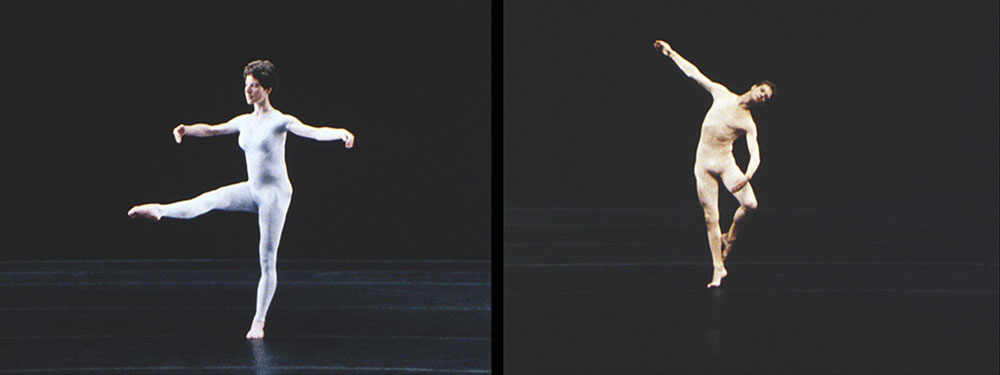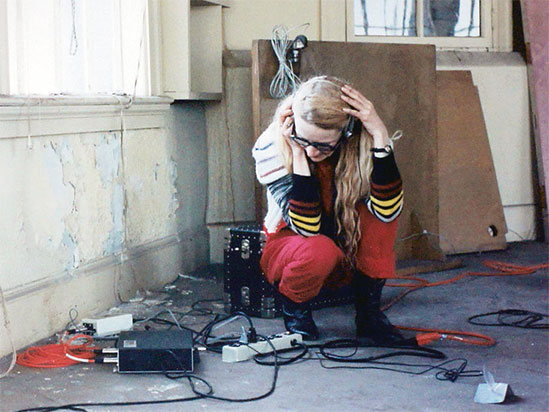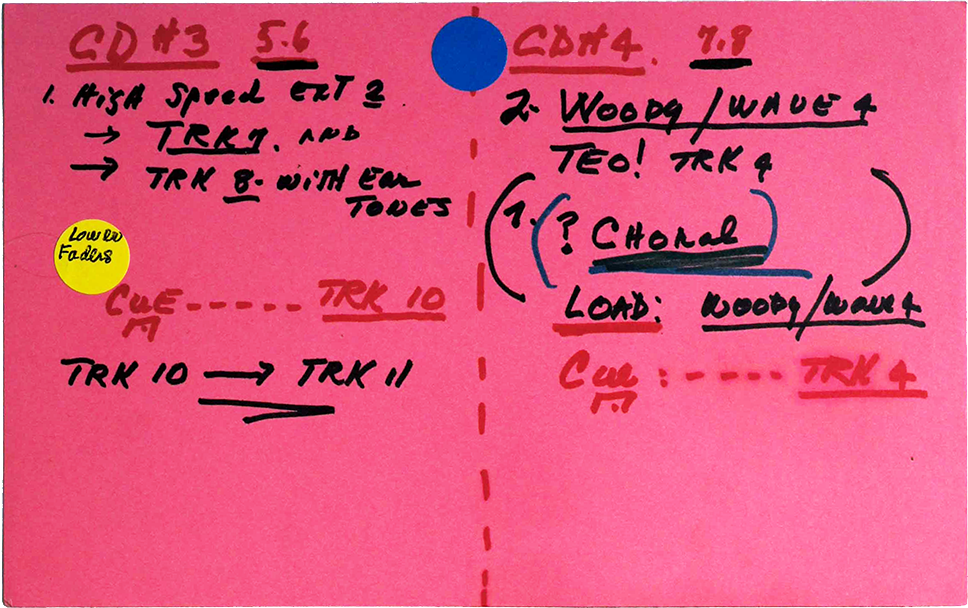The ICA will be on general strike on Fri 20 Oct. Read more
30 – 31 May 2019
The Institute of Contemporary Arts, in collaboration with London-based experimental music series Kammer Klang and Swiss music ensemble Contrechamps, is proud to present a series of programmes on the work of composer Maryanne Amacher. Spanning three events over two evenings, the series will culminate in the UK premiere of GLIA (2005) – a newly commissioned reconstruction of a rarely presented seminal work for seven instruments and electronics.
The Institute of Contemporary Arts, in collaboration with London-based experimental music series Kammer Klang and Swiss music ensemble Contrechamps, is proud to present a series of programmes on the work of composer Maryanne Amacher. Spanning three events over two evenings, the series will culminate in the UK premiere of GLIA (2005) – a newly commissioned reconstruction of a rarely presented seminal work for seven instruments and electronics.
The series begins on Thursday 30 May with a special screening of Charles Atlas’ film Torse (1977). The two-channel film documents Merce Cunningham’s eponymous choreography through multiple cameras, performed to Amacher’s composition Remainder (1976). Preceding this screening, previous Amacher collaborator Bill Dietz will be in conversation with musicologist Amy Cimini.
GLIA will be performed on Friday 31 May in the ICA Theatre, directed by Dietz and executed with Contrechamps and former members of Berlin-based Ensemble Zwischentöne (1988 – 2015). Before the performance, Dietz and Cimini will present a talk on Amacher’s work under the title Ghost Written Scenarios & Unnamed Sensibilities, contextualising GLIA within Amacher's body of work, and discussing her approach to installation and instrumentation.
Maryanne Amacher (1938 – 2009) is a vital figure in late-20th-century experimental music and sound installation. In the late 1960s, she pioneered what she termed ‘long distance music’ – telematic, site-related works that would later crystallise into her renowned City-Links series (1967 – 1980). These works comprised long-duration audio transmissions of distant urban sites via dedicated telephone lines. In the 1970s, Amacher developed ‘ear tone’ music (based on sounds organically generated by the ear, technically known as ‘otoacoustic emissions’) with the help of Marvin Minsky’s Triadex Muse, a synthesiser and compositional tool which utilises principles of artificial intelligence. Throughout her work, Amacher prefigured the ways in which technology – particularly telecommunications and machine learning – impact on perception, embodiment, and the human experience of space.
Maryanne Amacher was born in 1938 in Kane, Pennsylvania. She enrolled in the University of Pennsylvania in 1955, where she studied with composer and theorist Constant Vauclain and composers George Rochberg and Karlheinz Stockhausen. Amacher went on to hold a series of fellowships – at the University of Illinois’ Experimental Music Studio (EMS), MIT’s Center for Advanced Visual Studies (CAVS), SUNY Buffalo, Radcliffe, the Capp Street Project in San Francisco and many others, including international fellowships. After meeting John Cage at the University of Illinois in 1968, she went on to collaborate with him on Lecture on the Weather (1975) and later created Close Up (1979), the sound component for Cage’s Empty Words (1974). In the late 1970s and early 1980s, Amacher developed ‘Music for Sound-Joined Rooms’ and ‘Mini Sound Series’, presentational models for how her subsequent work should be ‘staged’. During the early 1980s, Amacher also worked on the materials for a multi-part drama originally imagined for TV and radio simulcast called Intelligent Life. While never fully realised, Intelligent Life reveals much of Amacher’s thinking on music and the advancement of potentialities for future listeners, transcending the social and physiological limitations of music as we know it. In the 1990s, Amacher continued to work internationally, and in the US she was commissioned to compose a large-scale work for the Kronos Quartet, received a Guggenheim Fellowship, performed at Woodstock ’94, and released her first CD on Tzadik (Sound Characters, 1999). In the 2000s, she participated in the Whitney Biennial (2002), joined the faculty of the Milton Avery Graduate School of the Arts at Bard College, and released a second CD with Tzadik (Sound Characters vol. 2, 2008). In 2005 she received Ars Electronica Foundation’s Golden Nica, their highest honour. Amacher died in Kingston, NY after sustaining a head injury and a subsequent stroke during the summer of 2009.
Amy Cimini is a violist and musicologist based in San Diego, CA. Her research, teaching and performance engage 20th-century philosophy and political thought with an emphasis on embodiment and ethics in experimental practice. Her musicological writing has appeared in Gamut, Contemporary Music Review, Sound Studies, boundary 2, Twentieth-Century Music and The Opera Quarterly. She is currently Assistant Professor of Music at UC San Diego and is happy to be finishing her first book, titled Wild Sound, about the musical thought of Maryanne Amacher. As a violist, Amy is a founding member of the chamber music collective Till by Turning and the improvising duo Architeuthis Walks on Land with bassoonist and composer Katherine Young. Touching Extremes notes the duo’s ‘manifest improvisational bravura (of the ruthless variety)’. Recently, Amy has enjoyed premiering Anthony Braxton’s operas Trillium R and Trillium J as a member of Braxton’s Tri-Centric Orchestra and touring the US and Europe in support of Architeuthis Walks on Land’s third record, The Surveyors (Carrier 2013).
Bill Dietz is a composer and writer, born in Arizona, and based in Berlin since 2003. Since 2012, he has been co-chair of Music/Sound at the Milton Avery Graduate School of the Arts at Bard College. His work on the genealogy of the concert and the performance of listening has brought him to festivals such as MaerzMusik and the Donaueschingen Festival, museums such as the Hamburger Bahnhof, Tate Modern, the Brooklyn Museum, the Stedelijk Museum, and the Museo de Arte Contemporáneo de Oaxaca. His work has been featured in publications such as Performance Research, boundary 2, Blank Forms, and the 2014 Whitney Biennial catalogue. Dietz’s large-scale public works have been realised in sites such as Le Corbusier’s Cité Radieuse in Marseille, the Bauhaus-Archiv in Berlin, and along the entire city block of Im Stavenhof in Cologne. From 2007 to 2015, Dietz was the artistic director of the Berlin-based Ensemble Zwischentöne, organising numerous festivals and concert series. In 2015, a monograph on his Tutorial Diversions was released, followed by a second monograph on his L’école de la claque in 2017.
Ensemble Contrechamps is a Geneva-based group of soloists who have specialised for over 40 years in the creation, development and diffusion of 20th- and 21st-century instrumental music. Since its creation, the ensemble has worked closely with a large number of composers (including Pierre Boulez, Rebecca Saunders, Brian Ferneyhough, Beat Furrer, Klaus Huber, Michael Jarrell and Matthias Pintscher) and also with a new generation of creators (including Rebecca Glover, Fernando Garnero and Paula Matthusen). Recent works have been commissioned by Chiyoko Szlavnics, Jacques Demierre, Bryn Harrison, Christine Sun Kim, Christopher Trapani, Abril Padilla and Massicot. The ensemble has recorded more than twenty albums, and in 2019 and 2020 will release two portrait albums in surround sound, one of Chiyoko Szlavnics and the other of Bryn Harrison, both under the Barcelona-based label Neu Records.
Since its founding by cellist Lucy Railton in 2008, the London-based monthly music series Kammer Klang has presented fresh takes on contemporary classical, experimental, improvised and electronic music. It has been praised as ‘one of the capital’s most exciting new-music series’ (Tempo), ‘one of [Cafe] Oto’s mainstays’ (The Observer), and namechecked by The Guardian as one of Britain’s leading new-music organisations. BBC Radio 3 admires its ‘strong track record in promoting innovative new-music events’ and broadcasts many of its events. Recent premieres and commissions include work by Annea Lockwood, Henning Christiansen, Catherine Lamb, Rebecca Glover and Jennifer Walshe.
Programme:

Thursday, 30 May, 6:30pm
Torse + Bill Dietz & Amy Cimini in conversation

Friday, 31 May, 7:00pm
Ghost Written Scenarios & Unnamed Sensibilities: Amy Cimini & Bill Dietz on the work of Maryanne Amacher

Thursday, 30 May, 6:30pm
Torse + Bill Dietz & Amy Cimini in conversation

Friday, 31 May, 7:00pm
Ghost Written Scenarios & Unnamed Sensibilities: Amy Cimini & Bill Dietz on the work of Maryanne Amacher

Friday, 31 May, 8:30pm











no. 236848.